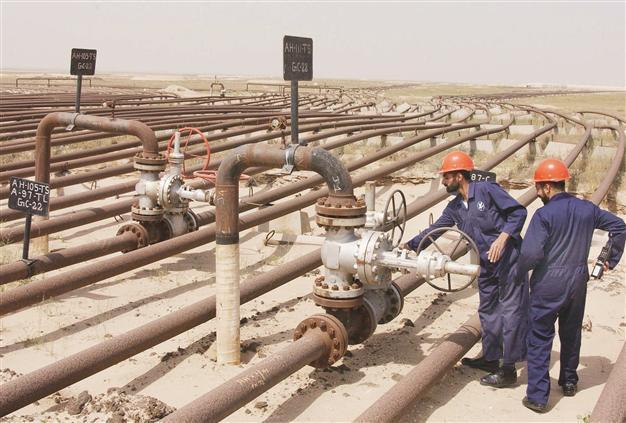Iraq ‘lost fight against Arbil’
ISTANBUL - Anatolia News Agency

The northern Iraqi oil fields have proven their potential, while the slow action in southern Iraq is pushing energy firms toward the north, according to Mehmet Sepil (inset) of Ankara-based Genel Energy. Hürriyet photos
The central Iraqi government in Baghdad has lost its
energy struggle against the rapidly developing Kurdistan Regional Government (KRG), which controls the autonomous north, according to Mehmet Sepil, the chief executive of Genel Energy, one of the most influential companies operating there.
The lingering problems between Baghdad and Arbil over opening the northern
oil and gas fields to international companies has been solved “de facto,” Sepil told Anatolia news agency in an interview.
“Baghdad has lost its oil and natural gas fight against northern Iraq,” Sepil said. “Let’s take a look at companies operating there currently: Exxon, Chevron, Total and Gazprom. These are some of the largest oil companies in the world. What’s more, Exxon, Total and Gazprom are also working in Baghdad [oilfields]. Baghdad says it will put those who operate in northern Iraq on a blacklist, but the largest companies in the world are working there. This issue is over. In addition, Baghdad operates too slowly, so the oil companies are escaping from there and moving to the north. The energy fight is over today. The important question is when Baghdad will admit this.”
Ankara-based Genel recently bought 21 percent of U.S.-based Hawler Energy’s share in the Bina Bawi field, raising its share there to 44 percent, Sepil saidd.
“The region will see a large consolidation. The number of [oil]companies in northern Iraq, which is between 40 and 50 today, will fall to between 10 and 15 in two or three years,” Sepil said, adding that the region has already proved its potential. What is happening in northern Iraq is typical, according to Sepil. “First the small companies penetrate, they find the oil, and sell [the field] after benefiting from it. Now this is the process taking place in northern Iraq.”
Genel to transport Kurdish gas and oil to TurkeyThe company’s goal is to bring Kurdish gas and oil to Turkey. Sepil estimates that northern Iraq’s oil production will be at 1 million barrels per day by 2015. “Turkey may be able to buy twice what it currently needs from northern Iraq soon. It may also buy some 10-15 billion cubic meters of natural gas from there.”
Turkey’s natural gas demand has increased by some 2 million cubic meters annually due to rapid growth. The only way for Turkey to cut costs will be to diversify its current supplies from Russia, Azerbaijan and Iran.
Genel Energy was formed by the merger of Vallares and Genel Energy International in November 2011. Vallares was a fund founded by former BP CEO Hayward, British financier Nat Rothschild, banker Julian Metherell and investment manager Tom Daniel. Genel Energy International was owned by Mehmet Emin Karamehmet, a Turkish tycoon. The merged company trades on the London Stock Exchange.
After the merger, Genel had capital worth $3 billion, Sepil said, noting that the company is determined to take its place in the consolidation in northern Iraq with its current potential of $1.4 billion. The company’s investment plans also include Africa. Genel is the largest producer in northern Iraq currently, Sepil said.
The Bina Bawi field has great potential, as does the Taq Taq field, where Genel is also active, Sepil said. “Currently OVM runs operations there, but with the acquisition we became the holder of the majority shares. Bina Bawi’s potential is equivalent to half a billion barrels, we believe. The capacity might even be higher.”
The company is also willing to take part in other regional projects, as it is already working a shorter-term project to take Taq Taq oil to the Kirkuk-Ceyhan line, the major pipe between Iraq and Turkey.
